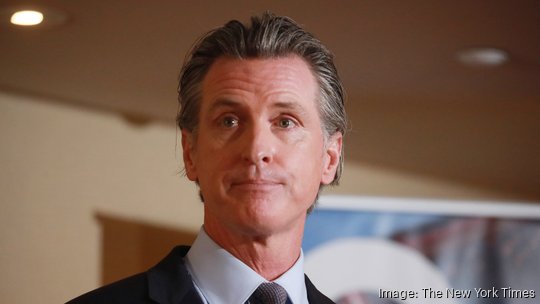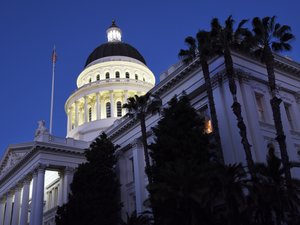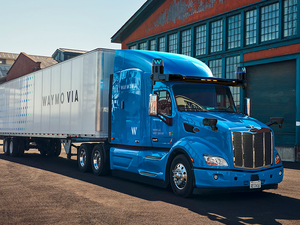
Gov. Gavin Newsom has vetoed a bill that would have required self-driving trucks operating on the state's public roads to have human safety operators on board.
Newsom vetoed the bill — Assembly Bill 316 — Friday, despite its wide support in both houses of the California Legislature. In his veto message, the governor argued that existing law is sufficient to regulate the industry.
"Assembly Bill 316 is unnecessary for the regulation and oversight of heavy-duty autonomous vehicle technology in California," Newsom said in his veto message.
Newsom's veto came after the state Senate approved the measure on a 36-2 vote and the Assembly backed it on a tally of 69-4. It was not immediately clear if either house will try to override the veto.
The bill sought to address risk and safety concerns associated with autonomous trucks and provide time for legislators to revisit and amend laws "to reflect advancements that address threats to public safety and jobs," according to its text. Throughout the bill's life, supporters pointed to various instances when autonomous vehicles malfunctioned.
State regulations currently prohibit driverless trucks. But the Department of Motor Vehicles is considering new rules that would allow them as soon as next year. AB 316 represented an attempt by the Legislature to block that move.
The bill would not have banned companies from testing or even deploying self-driving, heavy-duty vehicles on California roads. But it would have required a trained safety operator to be present in the event of an emergency. It would also have required autonomous truck companies to report collisions involving such vehicles to the DMV and any deactivation of the autonomous mode in test vehicles.
Additionally, the bill would have required the DMV to submit a report to the legislature by Jan. 1, 2029, on how autonomous vehicle technology has affected public safety and transportation sector employment.
The measure "places a needed guardrail on the deployment of autonomous medium- and heavy-duty vehicles on California's public roads," Assembly members Cecilia Aguiar-Curry (D-Winters) and Laura Friedman (D-Glendale), the measure's authors wrote in the bill's analysis. The testing and deployment of light-duty AVs "has been fraught with malfunctions" such as suddenly stopping in the middle of a road or causing accidents, they added.
The measure was strongly backed by the Teamsters Union, whose drivers stand to lose out if there's a broad shift to driverless trucks. By contrast, it was opposed by business groups and technology, trucking making and logistics companies that stand to benefit from such a shift.
Newsom argued the bill wasn't necessary
In his veto message, Newsom suggested AB 316 was not necessary because in 2012 lawmakers gave the state DMV the authority to regulate autonomous vehicle testing and deployment. The department monitors testing and operations of such vehicles and can suspend or revoke permits, the governor said.
In an effort to update its rules for both trucks and passenger vehicles, the DMV held public meetings earlier this year, Newsom said in his veto message. The agency's rule making process will continue to be public and transparent, he said.
"Autonomous vehicle technology is evolving and DMV remains committed to keeping our rules up to date to reflect its continued development in California," Newsom said.
The Autonomous Vehicle Industry Association (AVIA) —which represents Bay Area AV startups like Waymo, Gatik AI Inc., Cruise LLC, Nuro Inc, among others — had urged Newsom to veto the bill, saying it would undermine "oversight of expert regulators" in the state. The group had also argued the measure would cause the state to miss out on what the industry argues would be a safety initiative that could reduce motor vehicle deaths.
Thanks to Newsom's veto, "California's safety experts can continue to evaluate autonomous vehicle technology and consider appropriate regulatory action," Jeff Farrah, the association's executive director, said in a statement Friday. "We look forward to continuing to work with ... state regulators that are evaluating the future of autonomous trucking technology in the state."
In June, various startup CEOs and AVIA signed an open letter urging Newsom to direct state regulators to update California's regulations to allow autonomous trucking in the state. That letter pointed to a 2022 study published by the Silicon Valley Leadership Group Foundation, which estimated autonomous trucking could increase the state's economy by $6.5 billion and generate 2,400 new jobs.
"As CEOs, co-founders, leaders, and allied organizations of the autonomous trucking industry ecosystem, we are working each day to do something uniquely Californian — harness innovation to solve some of the world’s biggest challenges, including road safety and the supply chain crisis," the CEOs and AVIA said their letter.
— Andrew Mendez with Bay Area Inno contributed to this report.






